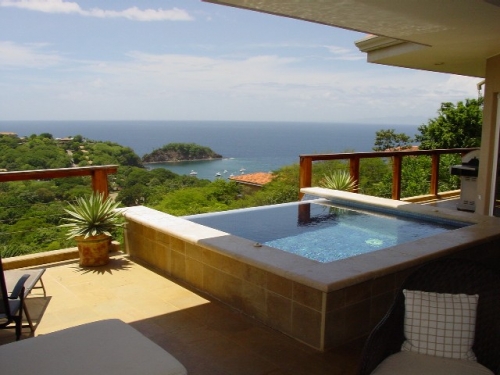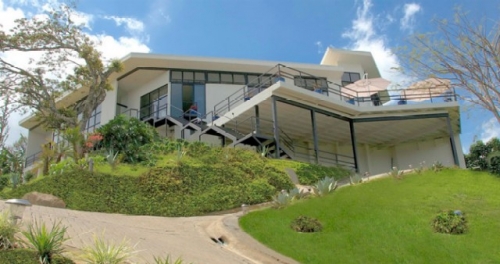Costa Rica Guide
Costa Rica Real Estate
List your property today!
Inclusion of real estate listings at Costa Rica Guide is
absolutely free of charge.
Featured Properties
Costa Rica Guide - Costa Rica Real Estate
Squatters Are One of Landowners' Biggest Headaches - But They Can Be Avoided
By Guillermo Escofet
The Tico Times
March 6, 1998
Last year's death of a U.S. resident in a shootout with squatters in the southern Pacific community of Pavones was an extreme example of the serious land ownership conflicts that can arise in Costa Rica.
Although, with its history of big-time drug smuggling and leftwing agitation, Pavones is in many ways an unusual case, it nevertheless typifies the squatter problem that afflicts many landowners in rural areas.
"The first mistake people make is to come with the naive assumption that the laws here are similar to back home," said Robert Wells, a U.S. attorney with 28 years' experience in Costa Rica, who has had to help many foreigners in conflicts with squatters.
As former Agriculture Minister Roberto Solorzano - appointed by outgoing President José María Figueres to find a solution to the land problems in Pavones - put it in a recent interview with The Tico Times: "What is often hard for North Americans to understand is that, in Costa Rica, property is not inviolable as in other countries." (TT, Jan. 9).
Although Costa Rica's Constitution describes legally titled property as inviolable (Article 45), this conflicts with the Agrarian Code, which gives various powers to land invaders.
Known locally as "precaristas", squatters begin to acquire rights to property three months after invading it, and can apply for its expropriation after a year of occupation.
According to Wells, landowners face big problems if they do not file for an eviction order within the first three months of an invasion.
"As long as you can prove they've been there for three months or less, the procedure is relatively fast and painless," said Wells. "However, if you wait, the procedure is much more long and involved, and it can take years to move them out."
Meanwhile, the longer squatters remain on the property, the more rights they accumulate. After a year, they can go to the Agriculture Development Institute (IDA) and have the land declared in "conflict".
Once that happens, IDA can eventually force the landowner to sell his property, which is then handed over to the precaristas.
These laws were originally introduced to allow poor, landless farmers to settle on land that was unoccupied or not in use, and claim it for themselves. The idea was to prevent the formation of the large absentee landholdings typical of other parts of Latin America, where a handful of wealthy "latifundistas" owned most of the land, and the majority had to scratch a living as landless laborers.
However, as Wells explained, Costa Rica's laws have fallen prey to crooked land speculators who organize land invasions to acquire valuable properties.
"I've seen well-organized squatters with political support behind them invade titled lands that are being used," he said. "Squatters will often persistently harass a landowner, until they wear him down and force him to give up."
Ironically, added Wells, in areas where properties are hard to sell, some landowners will actually hire squatters to stage an invasion and hope IDA slaps an expropriation order on them, to get the state to eventually buy the land.
Foreigners most at risk are those who rush foolishly into land purchases, and those who buy property as a second home, leaving it vacant for some or most of the year - a category into which many foreign owners fall.
In what he described as "cultural blindness", Wells said: "Many people come down to tropical paradise, and rush into too-good-to-be-true deals, doing things they wouldn't dream of doing in their own country."
U.S attorney Timothy Woodruff, owner of the real-estate management company Land Assurance, has this advice for buyers wanting to avoid squatter problems.
Before buying, carry out a visual inspection of the property - "it's surprising how many people blindly enter a contract without even visiting the property first," he said.
"You should go and take a good look," said Woodruff. "Talk to neighbors and try to find out something about the history of the place and what its current status is, to ensure there are no claims over it or it doesn't have problems with squatters.
"You should record the property on film, so that once you've bought it, you can prove there wasn't anyone there before, if you have any future conflict with squatters."
Often, squatters will transplant grown fruit trees and vegetable plants on to the land, to make it appear they have been farming there for longer than three months, he said.
"Once you've bought, and you hire a caretaker or watchman to look after the property in your absence, you should get him to enter a written contract and keep up to date with his salary and Social Security payments," added Woodruff. "Otherwise, he can turn against you and become a squatter himself."
Finally, said Woodruff, an owner should inspect the property at least four times a year, to catch any potential squatter invasion in time to file an eviction order.
Wells also advises putting fences and signs around the property, and hiring an administrator to oversee any workmen living on it. "If you take the right steps, there is no reason why you can't live here peacefully," said Woodruff.
Seeing a niche in the Costa Rican market for a company that would take care of properties for foreign absentee landowners, Woodruff set up Land Assurance last year. Among other things, the company carries out periodic patrols of customers' properties, taking photographs and videos with a record of the date and time.
The company also takes care of paying taxes and workers' salaries.
Stressing that he doesn't offer eviction or vigilante service, Woodruff also acts as mediator sometimes when squatter problems arise.
In cases of squatters with genuine needs, he said, the best approach is to try to establish a rapport with them and come to some sort of deal.
"We have to remember that we are visitors here, so we have to show respect," said Woodruff, who, although of North American heritage, was born and grew up in Panama, and feels empathy with local campesinos.
"Most of the cases we've run up against are of single peasant families who take a plot of land to eke out a living," he stressed.
Once engaged in a conflict with squatters, said Wells, foreign landowners should be aware of the peculiarities of the local judicial and law enforcement systems, which can often conspire against them.
"Many judges in rural areas [where squatter invasions are concentrated] see their role as having a social mission, which can often cloud their legal objectivity," he explained.
He added that there's also a prevailing xenophobic attitude, encouraged by vote-seeking politicians, of: "We Ticos are poor and you Gringos are rich, so you don't have any right to deny us these lands."
Also, said Wells, Costa Rica's police tend to be ineffective in protecting landowners from squatter attacks and threats - of which they are all too often victims.
"Policemen here tend to come from the low end of society," he explained. "Many can barely write, and are easily intimidated by lawyers. In situations of conflict, they don't like to stick their neck out."
Another problem faced by foreigners is finding a good lawyer to represent them, said Wells.
"While lawyers in the U.S. charge on an hourly basis and are liable to being sued by the client if they provide bad service, here they act more as notaries, charging a percentage of the deal, so they have very limited liability."
A good lawyer is especially important when making a purchase, said Wells. All documents should be checked and double-checked, and all legal requirements met to ensure no loopholes are left open.
"Try to get the best lawyer you can, and pay him by the hour to check all the legal steps. Even then, it might be worth having someone else check his work," warned Wells.
Inland, one can hold land as either titled or untitled property, and in the Maritime Zone, where land is public, one can hold it only under lease.
The Maritime Zone, with valuable beachfront properties and gross mismanagement by municipal governments, has attracted the most serious squatter problems -- the surfing beach area of Pavones being a case in point.
Many foreigners have been fooled into buying properties in the Zone by unscrupulous land speculators, who give them bogus property titles. This makes them more vulnerable in a conflict with squatters.
Untitled property beyond the Maritime Zone is non-registered land whose ownership is based on possessory rights. Although it is normally cheaper to buy, it is not as secure as titled land, said Woodruff.
Copyright 1998
Note: The above information is not to be used for any other purpose other than private study, research, criticism or review. Thank you.






